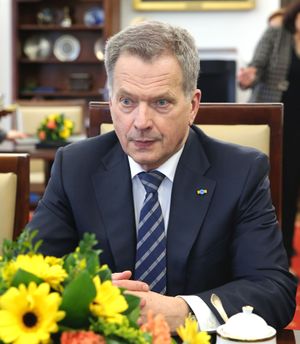Sauli Niinistö
Jump to navigation
Jump to search
(politician) | |||||||||||||||||||||
|---|---|---|---|---|---|---|---|---|---|---|---|---|---|---|---|---|---|---|---|---|---|
 | |||||||||||||||||||||
| Born | Sauli Väinämö Niinistö 24 August 1948 Salo, Finland | ||||||||||||||||||||
| Nationality | Finnish | ||||||||||||||||||||
| Alma mater | University of Turku | ||||||||||||||||||||
| Spouse | Marja-Leena Niinistö | ||||||||||||||||||||
| Member of | US/Department/State/International Visitor Leadership Program | ||||||||||||||||||||
| Party | National Coalition Party | ||||||||||||||||||||
Attended the 1997 Bilderberg as Finnish Minister of Finance and Deputy Prime Minister of Finland
| |||||||||||||||||||||
Sauli Niinistö is a former Finnish president and Bilderberger.
Niinistö report
In October 2024, Niinistö presented a report to EU Commission President Ursula von der Leyen on "Strengthening Europe's Civilian and Military Preparedness and Readiness", calling for a massive armaments and "security" program, among a large number of proposals.
- The report includes plans for greater intelligence agency cooperation. Niinistö calls to "strengthen EU intelligence structures step-by-step towards a fully-fledged EU service for intelligence cooperation."
- Spreading [made-up] intelligence reports in corporate media. To respond to "hybrid threats such as disinformation" the authors of the report recommend a 'naming and shaming' approach, "rapid attribution and the public use of intelligence to place hybrid actors on the backfoot, preventing or disrupting their malicious plans."
- The report calls for pouring money into the military-industrial complex, "against the backdrop of decades of relative underinvestment in areas such as defence". "At least 20% of the overall EU budget contributes to the EU's security and crisis preparedness."
- Enhance public-private cooperation. Letting big corporations dominate the decision-making process. "Systematically integrate private sector expertise in the development of preparedness policies and emergency planning." This includes things such as "Extend and formalise public-private crisis cooperation arrangements with the Commission that successfully enabled the acceleration of the development and authorisation of treatments and vaccines, as well as the management of the energy crisis."
- Expanding public-private partnerships beyond vaccine development, for instance as part of the Innovative Health Initiative, to encompass the entire spectrum of medical countermeasures, including therapeutics and diagnostics.
- Indoctrination of own citizens to a war mentality - "Actively engaging citizens in crisis preparedness starts with their risk and threat awareness". "The gradual integration of crisis preparedness and risk awareness, as well as media and digital literacy, into education programmes and curricula across the EU could be an additional option to ensure structural investment in societal resilience.
- The use of propaganda 'nutrition labels' to specify which news sources abide by certain ethical and transparency standards (e.g. NewsGuard) to guide citizens "better navigate the numerous dubious news sources appearing on their social media and/or search feed."
- The integration of advanced sensors and Internet of Things devices throughout urban infrastructure.
- Eternal military interventions around its borders. "The EU needs to remain present in fragile and politically sensitive settings that challenge our norms and values, ready to engage in (critical) dialogue and to support vulnerable groups, even if it recalibrates its overall support package. With war and tensions flaring up in a wide arc to our East and South, the EU faces a particular strategic responsibility to step up its security engagement and conflict resolution efforts.
- Total war approach - "reinforcing civilian-military cooperation to ensure that civilian and military crisis response actors enable each other and can operate seamlessly, including to prepare for the most severe military contingencies. For such scenarios, the EU and its Member States will need the capacity to effectively mobilise a whole-of-government response."
Events Participated in
| Event | Start | End | Location(s) | Description |
|---|---|---|---|---|
| Bilderberg/1997 | 12 June 1997 | 15 June 1997 | US Lake Lanier Georgia (State) | The 45th Bilderberg meeting |
| Munich Security Conference/2015 | 6 February 2015 | 8 February 2015 | Germany Munich Bavaria | "400 high-ranking decision-makers in international politics, including some 20 heads of state and government as well as more than 60 foreign and defence ministers, met in Munich to discuss current crises and conflicts." |
| Munich Security Conference/2016 | 12 February 2016 | 14 February 2016 | Germany Munich Bavaria | The 52nd Munich Security Conference |
| Munich Security Conference/2017 | 17 February 2017 | 19 February 2017 | Germany Munich Bavaria | The 53rd Munich Security Conference |
| Munich Security Conference/2018 | 12 February 2018 | 14 February 2018 | Germany Munich Bavaria | The 54th Munich Security Conference |
| Munich Security Conference/2019 | 15 February 2019 | 17 February 2019 | Germany Munich Bavaria | The 55th Munich Security Conference, which included "A Spreading Plague" aimed at "identifying gaps and making recommendations to improve the global system for responding to deliberate, high consequence biological events." |
| Munich Security Conference/2022 | 18 February 2022 | 20 February 2022 | Germany Munich Bavaria | Slightly less than 1/3 of the 664 of the participants have pages here |
| Munich Security Conference/2023 | 17 February 2023 | 19 February 2023 | Germany Munich Bavaria | Annual conference of mid-level functionaries from the military-industrial complex - politicians, propagandists and lobbyists. The real decisions are made by deep politicians behind the scenes, elsewhere. |
| WEF/Annual Meeting/2013 | 23 January 2013 | 27 January 2013 | World Economic Forum Switzerland | 2500 mostly unelected leaders met to discuss "leading through adversity" |
| WEF/Annual Meeting/2014 | 22 January 2014 | 25 January 2014 | World Economic Forum Switzerland | 2604 guests in Davos considered "Reshaping The World" |
| WEF/Annual Meeting/2016 | 20 January 2016 | 23 January 2016 | World Economic Forum Switzerland | Attended by over 2500 people, both leaders and followers, who were explained how the Fourth Industrial Revolution would changed everything, including being a "revolution of values". |
Many thanks to our Patrons who cover ~2/3 of our hosting bill. Please join them if you can.